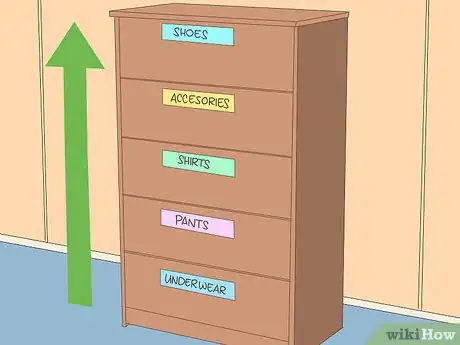This article was co-authored by wikiHow staff writer, Danielle Blinka, MA, MPA. Danielle Blinka is a Writer, Editor, Podcaster, Improv Performer, and Artist currently living in Houston, TX. She also has experience teaching English and writing to others. Danielle holds a Bachelor of Arts in English, Bachelor of Arts in Political Science, Master of Arts in English with a concentration in writing, and Master of Public Administration from Lamar University.
There are 11 references cited in this article, which can be found at the bottom of the page.
This article has been viewed 12,046 times.
Learn more...
Caring for someone with dementia is a difficult task that requires patience. It’s normal to have moments where you don’t know what to do, so don’t worry if you’re unsure about how to deal with dementia. It takes practice to learn how to best talk to someone with dementia, calm their aggressive behaviors, or help them with daily tasks. Fortunately, things can get better.
Steps
Talking to Someone with Dementia
-
1Speak in a calm tone and meet them at eye-level. It can be hard to stay calm when you're stressed or upset, but it can help you manage the situation better. The person may not remember who you are, so they may view you as a threat. Instead of looking down at them when you speak, try to stand or sit at eye-level. Additionally, use a soothing, reassuring tone to help them understand that you care for them.[1]
- If you speak down to them, they make feel like you’re being aggressive or might feel like you’re trying to boss them around. This may make them upset.
-
2Make eye contact with the person while they’re talking to you. Eye contact is a nonverbal cue that you’re actively listening to them. This helps them see that you care about what they have to say and respect them. When you ask a question or hear them start to speak, look them in the eye.[2]
- Keep your face neutral or friendly while you’re listening. For instance, you might give them a soft smile.
- It’s also helpful to nod along with what they’re saying so they know you’re listening.
Advertisement -
3Use short sentences so they’re more likely to understand. You're likely very busy, so being patient with them can be difficult. However, it’s probably hard for them to follow what you’re saying. Keep your questions and instructions short and concise so they understand. Additionally, try to use familiar words and stick to a small vocabulary.[3]
- For instance, ask, “Are you cold?” rather than, “Do you need another blanket to help you stay warm?”
- Similarly, say, “Drink your medicine,” not “Okay, so now you’re going to take this so you feel better.”
-
4Let them take as much time as they need to respond to your questions. It can be really hard to wait for them to respond, but it will help you keep the situation calm. They will likely need time to think before they respond to you. If they feel like you’re rushing them, they might get upset or frustrated. Instead, be patient with them as they try to find the words to answer.[4]
- You might say, “Think about it as long as you need to.”
-
5Acknowledge what they say without disputing it. This can be really hard, especially if you're caring for your relative. Because they’re confused and have trouble remembering, it’s likely that the person will say the wrong thing sometimes. However, it’s very hurtful to tell them they’re wrong, especially since what they’re saying feels very real to them. Instead, let them know that you heard what they said by repeating it back to them.[5]
- Say, “I understand that you were served the wrong lunch today. I’m sorry that happened to you, and we’ll try very hard to do better tomorrow.”
Tip: When you need to correct the person, do so only after validating what they said. Additionally, act like the correction is part of what they meant. For instance, say, “I know you’re upset because your dog isn’t here. Right now he can’t come visit, but here’s the soft blanket you like.”
-
6Give them a chance to speak for themself. You’ll likely be tempted to answer questions for them because they probably have a hard time responding. However, this can make the person feel ignored or disrespected, which can cause them to get upset. Instead, encourage the person to speak before jumping in. Then, help fill in the gaps as necessary.[6]
- For instance, if their doctor asks, “How is your hip feeling?” You might say, “Tell them how sore you are, Grandma.”
-
7Include them in conversations that are happening around them. The person will likely get confused and may not know what to say, but don’t act like they aren’t there. Encourage them to talk when they have something to say, and address them as you’re talking. This helps them feel acknowledged and respected.[7]
- For instance, let’s say you’re talking to a family member who’s come to visit. When they arrive, ask the person with dementia, “Do you remember Kate?” Later in the conversation, you might say something like, “Isn’t that funny?” or “What do you think, Grandma?” It doesn’t matter if what they say makes sense. Just go along with it so they feel included.
Calming Aggressive Behaviors
-
1Recognize that the person is likely feeling afraid or stressed. Dealing with aggression can be really difficult, especially if it's from a family member. When someone is being aggressive toward you, it’s normal to feel nervous or upset. Remind yourself that they’re likely feeling the same way. In most cases, the person’s behavior will have nothing to do with you. Focus on resolving the reason why they’re afraid or stressed, and you’ll likely be able to help them calm down.[8]
- Aggressive behaviors to watch for include shouting, name calling, pushing, and hitting. In some cases, they may also throw objects.[9]
- It’s okay to take a break when the person is being aggressive. This gives them a chance to calm down and lets you relax your nerves.
-
2Tell the person that you respect their feelings in a calm, reassuring tone. Dementia makes it hard for the person to express themself, so they may be aggressive because they don’t feel understood. Letting them know that you hear them can help them calm down. Tell them that you understand how they feel.[10]
- You might say, “I can see that you’re very upset about this. I understand how you feel, and I want to help.”
Tip: Say “yes” as much as possible so that they feel like their wishes are being respected. When you need to say “no” to something, try to turn your response into a yes. For instance, if the person asks, “Can I heat up my soup now?” say “Yes, I’ll go heat your soup right now.” Don’t say, “No, I’ll heat up your soup for you.”
-
3Make sure all of the person’s basic needs are being met. Check that they’ve eaten, have had plenty of fluids, have used the restroom, and feel comfortable. If any of these needs haven’t been met, address it immediately. This might help them calm back down.[11]
- It’s best to follow a routine so you know that they’re getting their needs met. Schedule their meals and snacks, bathroom breaks, and when they take their medication.
-
4Allow the person to do the thing they want to do if it doesn’t hurt them. Sometimes it’s okay to let the person do odd things if it’s not hurting them or anyone else. If they react aggressively when you try to stop them from doing something, ask yourself if the behavior is really a problem. If it’s not, let them continue do it and monitor them to make sure they stay safe.[12]
- For example, let’s say the person wants to wear 2 shirts at the same time. This won’t hurt them, so just let them do it.
- Similarly, if the person wants to flip TV channels continuously, just let them do it. Look away from the TV if it bothers you. Eventually, they’ll get tired of doing this on their own.
-
5Remove triggers that might be upsetting the person, when you can. Things like loud noises, bright lights, and unfamiliar smells can upset a person who has dementia. If you notice that they tend to get upset when a certain thing happens, try to avoid that trigger in the future. This may help reduce their aggression.[13]
- For instance, you might notice that the person gets upset when you play loud music in another room. You might be able to calm them down by turning the volume down.
- Similarly, they may get upset when they see their reflection because they don’t recognize themself. In this case, you could remove or cover the bathroom, bedroom, and hallway mirrors.
-
6Surround them with their favorite colors, scents, and mementos to soothe them. Using familiar items will help keep the person calm because it makes them more comfortable. Additionally, it may help them remember things they’ve forgotten. Talk to the person and their family members to find out what they used to enjoy. Then, do your best to incorporate those things into their daily life.[14]
- For example, spray their favorite perfume, serve their favorite meals, and put out photos of people they love.
- Similarly, play their favorite songs and turn on their favorite shows. This will give them a sense of security and will help calm their mood.
Helping with Daily Activities
-
1Let the person help with daily tasks when they’re able to do so. It’s understandable that you’d want to do things for the person because it’s easier and saves time. However, including them in the process helps them maintain their independence and helps them retain life skills. Overall, this will benefit both of you. Do your best to let them help when they can, such as by letting them feed themself.[15]
- How you include them will depend on the severity of their condition. For instance, someone in the early stages of dementia may be able to do most things on their own. If the person is moderately affected, they may be able to try things like dressing themself or getting a snack but may need a lot of help. If the person has severe dementia, you might do most of the task for them.
-
2Place memory reminders around the home to help them remember. Put labels on the doors so they know which room it is, and label the kitchen cabinets and drawers. Post a list of the household routine on the refrigerator or wherever the person will see it best, and set medication reminders to help them take their meds. Additionally, post reminders that are specific to the person’s needs.[16]
- For example, if the person has trouble figuring out which bedroom is theirs, put up a label. Similarly, if they get confused about which medication to take, put them in containers marked with "morning" and "night."
-
3Give them small portions of foods they like if they aren’t eating enough. It’s common for people with dementia to resist meals because they may have trouble eating or don’t realize they’re hungry. However, they need to eat. You can help by offering them smaller portions of easy-to-eat foods that you know they like.[17]
- For instance, soup and mashed potatoes are both easy to eat.
- Schedule meal times so that they become a routine.
- If the person starts refusing a certain dish, try a food with a different taste. It’s possible that the person has developed a dislike for a certain flavor, like saltiness.
-
4Make sure all walkways are clear and free of trip hazards. You don’t want the person to get hurt, and keeping the floor and outside walkways clear can help. Do daily sweeps to make sure that all pathways are clear. This will help them move around their home safely.[18]
- If the person has trouble with coordination, make sure their cane or walker is nearby at all times. Similarly, you might ensure that they have sturdy furniture to hold onto when necessary.
- Check that rugs and carpets are straight and flat against the floor. They can become trip hazards if the rug gets bent or flipped up.
-
5Help them maintain proper hygiene but let them help if possible. The person needs to bathe, brush their teeth, and comb their hair every day. Whenever possible, they should do these tasks themself. However, they may need help from you. Be discrete when offering help with hygiene tasks.[19]
- For instance, you might help the person get into the shower and sit in their shower seat, but you might let them wipe themself with the washcloth.
-
6Lay out clothes in the order they put them on to help them get dressed. For instance, you might lay out their clothes on their dresser. Put their underwear first, followed by pants and a shirt. Shoes come last, if they’re wearing any. This helps them follow the process for getting dressed without having to remember it.[20]
- If they struggle to put on the pieces, help them with that, as well.
References
- ↑ https://www.caregiver.org/resource/caregivers-guide-understanding-dementia-behaviors/
- ↑ https://www.alzheimers.org.uk/about-dementia/symptoms-and-diagnosis/symptoms/how-to-communicate-dementia
- ↑ https://www.alzheimers.org.uk/about-dementia/symptoms-and-diagnosis/symptoms/how-to-communicate-dementia
- ↑ https://www.alzheimers.org.uk/about-dementia/symptoms-and-diagnosis/symptoms/how-to-communicate-dementia
- ↑ https://www.nhs.uk/conditions/dementia/communication-and-dementia/
- ↑ https://www.caregiver.org/resource/caregivers-guide-understanding-dementia-behaviors/
- ↑ https://www.nhs.uk/conditions/dementia/communication-and-dementia/
- ↑ https://www.alzheimers.org.uk/about-dementia/symptoms-and-diagnosis/symptoms/aggressive-behaviour-and-dementia
- ↑ https://www.alz.org/national/documents/brochure_behaviors.pdf
- ↑ https://www.alzheimers.net/1-6-15-new-approaches-difficult-behaviors/
- ↑ https://www.alz.org/help-support/caregiving/daily-care/food-eating
- ↑ https://www.alzheimers.net/1-6-15-new-approaches-difficult-behaviors/
- ↑ https://www.alzheimers.net/1-6-15-new-approaches-difficult-behaviors/
- ↑ https://www.alzheimers.net/1-6-15-new-approaches-difficult-behaviors/
- ↑ https://www.nhs.uk/conditions/dementia/carers/
- ↑ https://www.nhs.uk/conditions/dementia/carers/
- ↑ https://www.caregiver.org/resource/caregivers-guide-understanding-dementia-behaviors/
- ↑ https://www.nia.nih.gov/health/home-safety-checklist-alzheimers-disease
- ↑ http://www.dementia.com/coping-with.html
- ↑ http://www.dementia.com/coping-with.html























-Step-14-Version-2.webp)























































Medical Disclaimer
The content of this article is not intended to be a substitute for professional medical advice, examination, diagnosis, or treatment. You should always contact your doctor or other qualified healthcare professional before starting, changing, or stopping any kind of health treatment.
Read More...